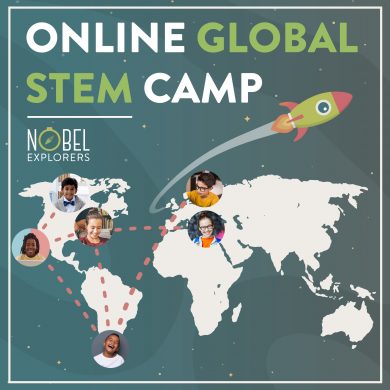How Does Nobel Explorers Help Your Child Build Confidence?
Confidence is something every parent wants for their children. However, confidence isn’t a sort of gift we can give them. It’s something that is built.
Carl Pickhardt says that a child who lacks confidence will be reluctant to try new or challenging things because they’re scared of failing or disappointing others. They may feel stressed, anxious, frustrated, etc. That’s why, besides other benefits, we want to emphasize Nobel Explorers’ ability to help build confidence. So how do we help?
Getting to the next developmental stage
Nobel Explorers relies on something called the zone of proximal development (ZPD). ZPD is Vygotsky’s term for:
The distance between the actual development level as determined by independent problem solving and the level of potential development as determined through problem-solving under adult guidance or in collaboration with more capable peers.
In other words, ZPD is the range of skills that a child can perform with assistance but can’t (yet!) perform independently. So what is our role?
Our experts guide students
This is where our experts come into it. By becoming a Nobel Explorer, your child gets a chance to work with a team of highly-qualified facilitators, who help to activate skills and guide the experience.
They provide instructions and tools to students, so while a child might not yet be capable of doing something on their own, they’re able to complete the task with the assistance of the skilled instructor.
HELP YOUR CHILD RISE TO THE NEXT LEVEL
Peer learning
During certain periods of a child’s life, especially the teenage years, they may look to their peers more than they look to adults. Peers can provide valuable knowledge and assistance but also provide a unique comfort level at this age. Therefore, our students don’t learn only from our experts, but also their peers!
In our online STEM camp, students teach and learn from each other. Every student is better at something than the others and knows things others don’t. So, while they’re doing their project, they share that knowledge and skills with other teammates.
Nobel Explorers’ journey in short
In Nobel Explorers, students develop their ideas, solve problems along the way, and generate a product to be proud of. How? At first, students are confronted with new tasks they can’t quite do easily on their own – challenges. Then our experts help them set their goals and provide the appropriate assistance that gives the student enough of a boost to achieve the task. Also, their teammates help them with things they still have trouble with, so everybody within the team acquires and masters new hard and soft skills.
However, as time passes, students need less and less assistance. Eventually, instructions can be removed and students are able to make a website (or to code/ design something else) by themselves. And that is when we achieve our goal – children become independent and comfortable in practicing gained skills!
Our interns made the awesome website!
Giving praise and badges
During the whole Nobel Explorers’ journey, students are welcomed to share their viewpoints and ideas and every one of them is valued. And we love to give them praise (they’ve certainly deserved it!) Not only every completed task but also every effort is followed by positive reinforcement. That makes our online STEM camp a safe and supportive environment for learning and helps a student feel proud of what they’ve achieved. And our favorite praise is badging! So every time our students gain new soft skills, we award them the appropriate badge. That helps them feel more sure of themselves and more confident in what they do.
And when they build confidence in what they’ve done, they feel more comfortable in showing it to others. So they present their project to other teams, families, and friends. In this way, they tame their fear of public speaking. And as the audience grows, their self-esteem and confidence grow!

When our students master the skill of giving feedback, we award them this badge, Constructive Colonel. This time, we invite you to leave us feedback (comment below) and The Constructive Colonel is yours! 🙂

